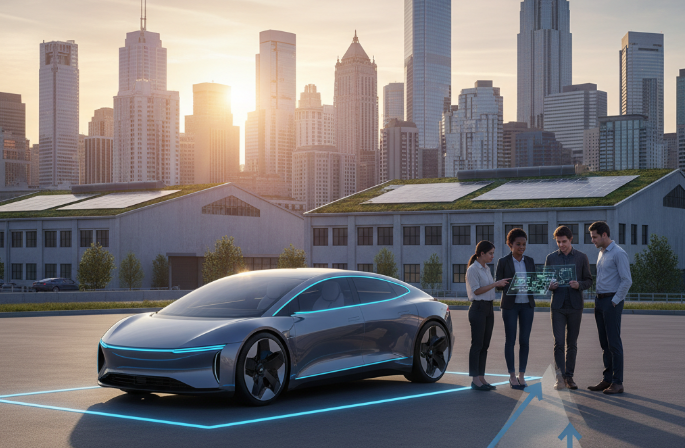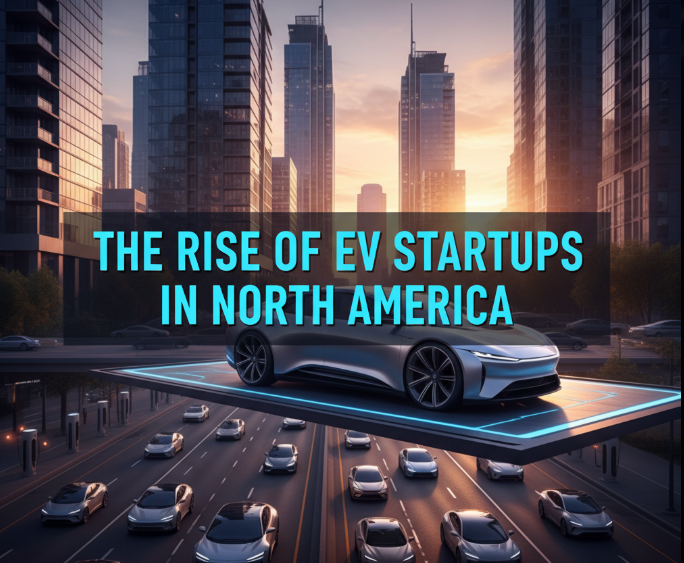Introduction: A New Wave of Mobility
North America is experiencing a revolution in how people think about transportation. Electric Vehicles (EVs), once seen as futuristic concepts, are now at the center of automotive innovation. While giants like Tesla, Ford, and General Motors dominate the headlines, a new class of EV startups in North America is reshaping the landscape. These companies are bringing fresh ideas, daring designs, and disruptive technologies that challenge the traditional auto industry.
From passenger cars to commercial trucks, and even electric motorcycles, startups are stepping up to meet consumer demand for cleaner, smarter, and more affordable mobility. But what’s fueling this rise, and which companies are leading the charge? Let’s take a deep dive into this growing phenomenon.
Why EV Startups Are Thriving in North America
Several key factors have created fertile ground for startups to enter the EV space:
1. Growing Consumer Demand
- More North Americans are concerned about climate change.
- Rising gas prices make EVs financially attractive.
- Consumers want modern, tech-savvy vehicles with smart features.
2. Government Support and Incentives
Both the U.S. and Canada have rolled out tax credits, rebates, and infrastructure investments to push EV adoption. For example:
- U.S. federal EV tax credits up to $7,500.
- Canada’s iZEV program offers up to CAD $5,000 rebates.
- Local states/provinces add more benefits (free parking, reduced tolls, HOV lane access).
3. Investor Interest in Green Mobility
Venture capital and private equity firms are pouring billions into clean tech. Investors see EV startups as the “next Tesla” opportunity.
4. Advances in Technology
- Battery costs have dropped nearly 90% in the last decade.
- Charging infrastructure is expanding rapidly.
- Startups leverage digital platforms for sales, avoiding costly dealership networks.
North America’s EV Startup Ecosystem
Unlike traditional automakers, startups move fast and take risks. Here are the categories where they are making the biggest impact:
Passenger Car Startups
- Lucid Motors (California, USA): Luxury EVs with record-breaking range.
- Fisker Inc. (California, USA): Stylish, eco-friendly SUVs like the Fisker Ocean.
- Canoo (Arkansas, USA): Subscription-based EV models with futuristic design.
Electric Truck & Commercial Vehicle Startups
- Rivian (Illinois, USA): Specializes in electric trucks and SUVs, partnered with Amazon for delivery vans.
- Nikola Motors (Arizona, USA): Focuses on hydrogen-electric trucks.
- Lion Electric (Quebec, Canada): Manufactures electric buses and commercial trucks.
Niche & Specialty EV Startups
- Arcimoto (Oregon, USA): Small three-wheeled EVs for urban commuting.
- Electra Meccanica (Vancouver, Canada): Known for its single-passenger EV “SOLO.”
- Zero Motorcycles (California, USA): A leader in electric motorcycles.
Table: Key North American EV Startups at a Glance
| Startup | Country | Focus Area | Notable Models/Projects | Funding Highlights |
|---|---|---|---|---|
| Lucid Motors | USA | Luxury Cars | Lucid Air | Backed by Saudi PIF |
| Rivian | USA | Trucks/SUVs | R1T, R1S, Amazon Vans | IPO raised $12B |
| Fisker Inc. | USA | SUVs | Fisker Ocean | Contract with Magna |
| Canoo | USA | Lifestyle EVs | Canoo Lifestyle Vehicle | Walmart partnership |
| Nikola Motors | USA | Trucks | Nikola Tre, Nikola Two | Hydrogen focus |
| Lion Electric | Canada | Buses/Trucks | LionC, Lion8 | Canadian gov. support |
| Arcimoto | USA | Micro-EVs | Fun Utility Vehicle (FUV) | Niche urban market |
| Electra Meccanica | Canada | Micro-EVs | SOLO | Publicly traded |
| Zero Motorcycles | USA | Motorcycles | SR/F, FXE | EV two-wheel leader |
How EV Startups Compete Against Auto Giants
Startups don’t have the legacy, but they do have advantages:
- Agility: They can pivot quickly to new designs and trends.
- Direct-to-Consumer Sales: Many sell online without dealerships.
- Innovation Focus: Startups experiment with battery swaps, solar integration, and subscription ownership.
- Niche Targeting: Instead of competing with Ford head-on, they target specific markets (luxury EVs, delivery vans, motorcycles).
Meanwhile, big automakers struggle with legacy supply chains, union contracts, and massive overhead.
Challenges Facing EV Startups
While the rise is exciting, survival is not guaranteed.
Key Challenges:
- Funding Pressure – High capital needs for R&D and production.
- Scaling Production – Many stumble when moving from prototypes to mass manufacturing.
- Supply Chain Risks – Battery shortages and reliance on rare earth minerals.
- Competition – Giants like Tesla, GM, and Ford have deep pockets.
- Consumer Trust – Startups must prove reliability, safety, and long-term support.
Infographic: Success Path of an EV Startup
Concept → Prototype → Funding → Production → Sales → Expansion
(Imagine a step-by-step visual with icons: lightbulb → prototype car → investors → factory → customers → global growth.)
The EV Startup Funding Boom
North America has seen record-breaking investments in EV startups:
- Rivian raised over $10 billion before its IPO.
- Lucid Motors got $1 billion+ from the Saudi Public Investment Fund.
- Fisker raised $1 billion via SPAC merger.
Graph: EV Startup Funding Growth (2015–2025)
(Bar chart showing rising billions in investment every year.)
Government’s Role in Supporting Startups
Both the U.S. and Canadian governments are betting big on EVs.
U.S. Support
- Infrastructure Investment and Jobs Act: $7.5B for charging networks.
- Inflation Reduction Act: Tax credits for EV buyers, incentives for local battery production.
Canadian Support
- Investments in EV battery plants in Ontario and Quebec.
- Strong support for companies like Lion Electric and Electra Meccanica.

The Role of Partnerships
Startups often partner with giants to survive:
- Rivian + Amazon → Delivery vans contract.
- Fisker + Magna → Manufacturing partnership in Europe.
- Canoo + Walmart → Fleet purchase agreement.
- Lion Electric + Canadian Government → School bus contracts.
What Makes North America Attractive for EV Startups?
- Large consumer market with high demand for innovation.
- Strong tech ecosystem (Silicon Valley, Toronto, Austin).
- Government subsidies for clean energy.
- Venture capital concentration.
- Established infrastructure for auto R&D.
Future Outlook: Where Are EV Startups Headed?
Predictions for 2025 and Beyond:
- More Consolidation – Smaller players may merge or get acquired.
- Focus on Affordability – Budget-friendly EVs for the mass market.
- Battery Innovation – Solid-state batteries could change the game.
- Fleet Electrification – Delivery companies will adopt startup-made EVs.
- Sustainability Push – Use of recycled materials and green manufacturing.
EV Startups vs. Traditional Automakers: Who Wins?
| Factor | Startups | Traditional Automakers |
|---|---|---|
| Innovation Speed | Fast, flexible | Slower due to legacy |
| Brand Recognition | Low, but growing | Strong global presence |
| Financial Resources | Limited, reliant on investors | Massive reserves |
| Risk of Failure | High | Lower |
| Consumer Perception | Exciting, futuristic | Reliable, established |
Both will play a role, but startups often act as innovation labs, pushing the industry forward while giants scale it globally.
Conclusion: The Road Ahead for North American EV Startups
The rise of EV startups in North America is not just a trend—it’s a revolution. These young companies are rewriting the rules of the auto industry with bold ideas, high-tech designs, and a deep focus on sustainability. While challenges remain, from funding to production, the momentum is undeniable.
For consumers, this means more choices—from luxury EV sedans to budget-friendly micro-EVs and powerful electric trucks. For the industry, it means faster innovation. And for the planet, it means a cleaner, greener future.
In the next decade, expect to see today’s startups either grow into household names—or inspire the next generation of innovators who will carry the torch forward.

Leave a Reply